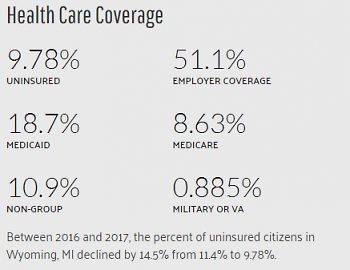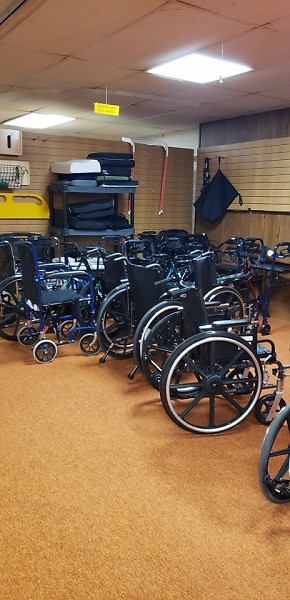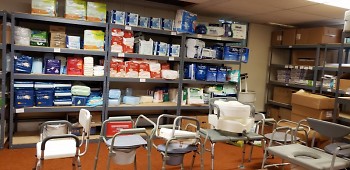Healthcare costs can be overwhelming for someone who already struggles to meet basic needs. Durable Medical Equipment (DME), like walkers, wheelchairs, shower chairs, and more, can make recovering from an illness or injury easier, but only if the person can afford the equipment they need. Almost 10% of Wyoming, MI residents are not covered by health insurance, and another 18% are on Medicaid. They are the reason for the DME Lending Closet at Family Network of Wyoming.
Unfortunately, during the peak of the Covid-19 crisis this spring, Family Network had to make the tough choice to temporarily suspend the medical lending program. The organization is also home to a large food pantry. As the number of people in need of food assistance surged, reaching over 2,700 in April, the team at Family Network evaluated where to focus the limited volunteer and staff time available. The medical lending program was put on hold to meet the needs of people out of work and seeking food assistance.
The number of neighbors coming for food assistance has slowly tapered off as people were able to go back to work. "We typically serve around 1,000 people a month, and numbers in May and June are closer to what is typical," said Karrie Brown, Executive Director of Development at Family Network. As the demand for emergency food lessened, the organization again evaluated if the time and resources existed to resume the DME lending program.
"We wanted to make sure we had the capacity to serve where we were most needed in the moment. Now that visitors to the drive-up food pantry are back near pre-Covid levels, we are glad to be able to reopen medical equipment lending," Karrie reported. "The first piece of equipment that went out was a walker, loaned to a woman recovering from Covid. Her family was grateful to have this to help her get around. She just isn't back to 100% strength yet, and the walker is going to help her remain steady on her feet while she recovers. We were glad to be able to say "Yes, we can help!" when we got the call. This program is making a difference for her, like it has made a difference for so many people over the years," said Brown.
People learn of the DME Lending Closet in a variety of ways. One neighbor who has used the food pantry at Family Network, Wendy, said "I tell people about this regularly." She has seen first-hand the difference the equipment can have for people and wants to make sure as many people as possible know the program exists. Local hospitals also share with their patients that they can call on Family Network if they need help.
Family Network has a wide variety of DME available to lend, including:
- Wheelchairs
- Walkers
- Canes
- Shower Chairs
- Toilet Risers
- Transfer Boards
- Incontinent Supplies
- Crutches
- And more
The equipment comes to Family Network by donation from people who no longer need it. The organization checks that it is in good working order, makes repairs when needed, and sanitizes each piece to ensure it is safe for use by the next person. They ask that people be able to demonstrate financial need, provide a valid picture ID, and sign a liability waiver before checking out the equipment. Because supplies are limited, Family Network prefers that people call in advance to check that what they need is available. "We don't want someone to drive or take the bus to come get something that we don't have in the building," Karrie Brown said. "Their time is valuable and making an extra trip can be a strain on their health or their resources."
To learn more about DME Lending, the food pantry, or other services provided by Family Network, visit their website at http://www.fntw.org. If you need DME, you can call the organization at 616-885-9919 to discuss your situation.
The Rapidian, a program of the 501(c)3 nonprofit Community Media Center, relies on the community’s support to help cover the cost of training reporters and publishing content.
We need your help.
If each of our readers and content creators who values this community platform help support its creation and maintenance, The Rapidian can continue to educate and facilitate a conversation around issues for years to come.
Please support The Rapidian and make a contribution today.


